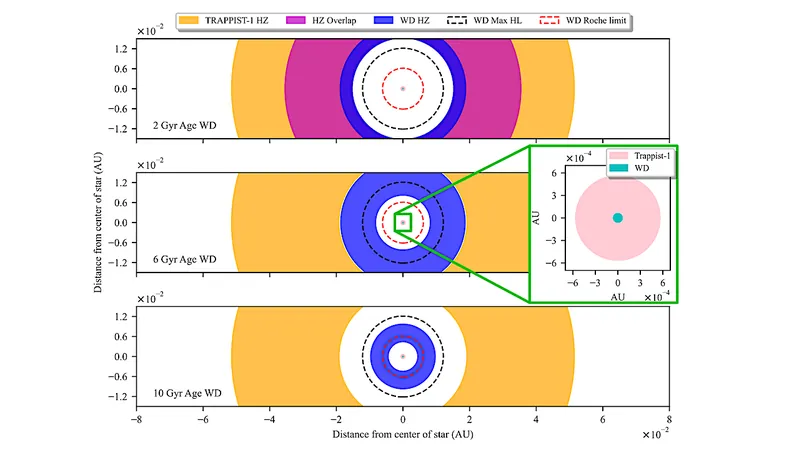
Could Life Thrive Around White Dwarfs? New Discoveries Open Up Exciting Possibilities!
2024-12-02
Author: Emma
Recent astronomical discoveries have reignited interest in the possibility of life existing around white dwarfs—dense remnants of stars that have shed their outer layers after exhausting their nuclear fuel. Observations have confirmed that exoplanets orbiting these celestial bodies could potentially host habitable environments, prompting scientists to delve deeper into their characteristics.
In a groundbreaking study, researchers have calculated the habitable zone limits for Earth-like planets orbiting a typical white dwarf, specifically one with a mass of about 0.6 solar masses. Their findings suggest that an Earth-sized planet situated at approximately 0.012 AU (or roughly three times closer than Mercury is to our Sun) could remain within the habitable zone for an astonishing duration of nearly 7 billion years. This extended period enhances the likelihood for conditions that could support life forms to emerge and sustain themselves.
Moreover, this study explores new constraints for habitability criteria, including photon flux thresholds essential for UV-mediated processes like prebiotic chemistry and photosynthesis. Interestingly, the research indicates that these crucial photon levels are comfortably met by planets residing within the habitable zone around white dwarfs.
The implications of these findings are profound. Scientists now believe that the search for life beyond our Solar System could focus more on these intriguing exoplanets. Current advancements in space technology, particularly the James Webb Space Telescope (JWST), are bolstering efforts to detect atmospheric biosignatures—indicators of potential life forms. The study reveals that observing these biosignatures may only require observation times as short as one hour, significantly enhancing our ability to identify markers of life.
As we expand our understanding of habitable worlds, the possibilities seem endless. Could white dwarf systems be the next frontier in our quest to find extraterrestrial life? The universe might just surprise us yet again!









 Brasil (PT)
Brasil (PT)
 Canada (EN)
Canada (EN)
 Chile (ES)
Chile (ES)
 España (ES)
España (ES)
 France (FR)
France (FR)
 Hong Kong (EN)
Hong Kong (EN)
 Italia (IT)
Italia (IT)
 日本 (JA)
日本 (JA)
 Magyarország (HU)
Magyarország (HU)
 Norge (NO)
Norge (NO)
 Polska (PL)
Polska (PL)
 Schweiz (DE)
Schweiz (DE)
 Singapore (EN)
Singapore (EN)
 Sverige (SV)
Sverige (SV)
 Suomi (FI)
Suomi (FI)
 Türkiye (TR)
Türkiye (TR)